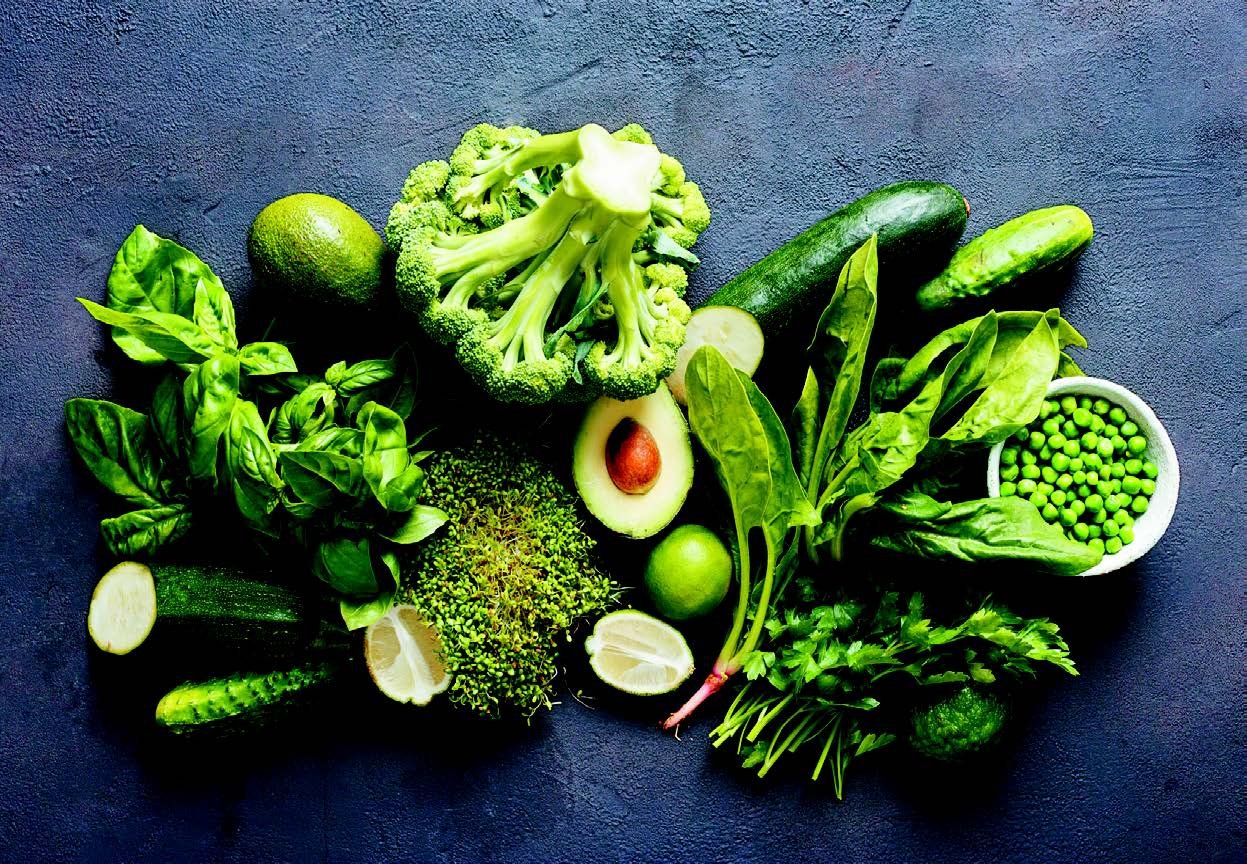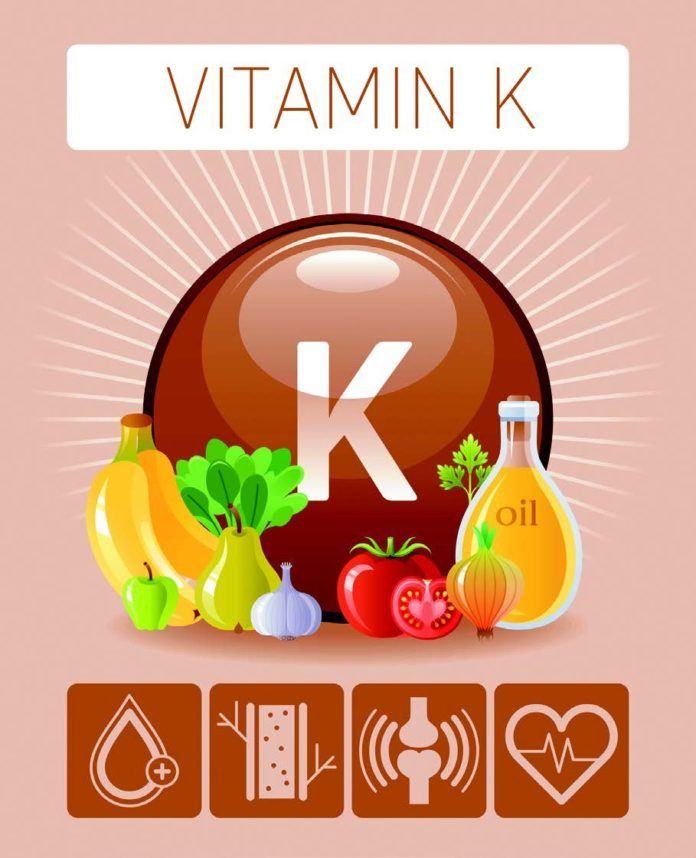Vitamin K was named for its role in coagulation (koagulation in German), but it turns out this important vitamin has significant roles beyond blood clotting. Work by Tufts researchers and others shows that vitamin K may be an important factor in bone health, cardiovascular health, and type 2 diabetes.
Vitamin K1 versus K2: The originally-identified form of vitamin K is vitamin K1. “There are actually 11 forms of vitamin K,” says Sarah L. Booth, PhD, a professor at the Friedman School of Nutrition Science and Policy and director of the Jean Mayer USDA Human Nutrition Research Center on Aging (HNRCA). “Vitamin K1 is found in plants. The other 10 forms of vitamin K are collectively known as vitamin K2. One form of vitamin K2 is made in our bodies from vitamin K1. The other nine forms are produced by bacteria, either in the human gut or in foods fermented with the use of bacteria, including cheese, yogurt, and other fermented dairy products.” Our gut bacteria and fermented foods, therefore, may play an important role in what forms of vitamin K we have in our bodies.
The Calcium/K Connection: Vitamin K appears to play a critical role in the regulation of calcium in our bodies. “There are certain proteins responsible for keeping calcium away from places we don’t want calcium—like our joints and our arteries—and these proteins cannot function without vitamin K,” says Booth. Low vitamin K status, therefore, could potentially increase risk for build-up of calcium in the artery walls (hardening of the arteries) and the calcification of joint tissue that leads to osteoarthritis. “Adequate intake of dietary vitamin K cannot reverse hardening of the arteries, for example, but it is associated with lower risk of the calcification spreading,” says Booth.
Kyla Shea, PhD, a scientist in the vitamin K lab at the HNRCA, has been studying vitamin K and osteoarthritis. “In observational studies we and others have found better vitamin K status to be associated with less osteoarthritis and better lower-extremity function and mobility,” says Shea, “but we will need clinical trials to know for sure if vitamin K can reduce osteoarthritis development or progression.” Since osteoarthritis is the leading cause of lower extremity disability in older adults, and this age group is also more likely to have lower vitamin K intakes, Shea points out it is particularly important for older adults to be aware of this possible connection.
There may also be a connection between vitamin K and bone health. “Multiple proteins in bone require vitamin K,” says Booth, “and some data suggest a fairly strong association between blood markers of vitamin K intake and bone mineral density in older adults. But multiple randomized controlled trials that gave people either vitamin K1 supplements or a placebo found no benefit of K1 supplementation for bone health.”
Vitamin K2 and Diabetes: According to Dariush Mozaffarian, MD, DrPH, dean of the Friedman School of Nutrition Science and Policy and editor-in-chief of Tufts Health & Nutrition Letter, a growing body of research suggests that vitamin K2 may also protect against type 2 diabetes. “In small controlled trials, vitamin K2 supplements have improved insulin sensitivity and glucose handling,” says Mozaffarian, “perhaps through effects on metabolism of osteocalcin, an important hormone. Vitamin K2 may also reduce inflammation by inactivating key pro-inflammatory pathways. In long-term observational studies, foods rich in vitamin K2, such as cheese, are also linked to lower risk of type 2 diabetes.” This emerging research suggests that vitamin K2 may help prevent type 2 diabetes. “This potential effect is not yet widely recognized, and I believe future research will focus on vitamin K2 levels in cheese and other fermented foods and their possible benefits for type 2 diabetes,” says Mozaffarian.

Image © KucherAV | Getty Images
No Supplements Necessary: “There are insufficient data to support people taking dietary supplements of any form of vitamin K,” says Booth. “Some messages in the popular press are saying that the compounds known as vitamin K2 are better absorbed or in some other way superior to vitamin K1, but no definitive study has been done to date to demonstrate that one form is better than another. Data from our work is showing no significant difference. As long as a person eats a variety of healthy foods, including fruits and vegetables, he or she will get all the vitamin K needed.” The potential influence of differences in vitamin K2 production from a person’s gut microbiome, or from eating fermented foods, requires mores study.
Diet can provide enough vitamin K1 and K2. To ensure you get enough vitamin K:
- -Make leafy greens a regular part of your diet.
- -Eat greens with some fat to enable absorption of vitamin K (olive oil, soybean oil, nuts, and avocados are good choices).
- -Choose plant oils, which are rich in vitamin K, for cooking and dressing foods.
- -Along with more traditional fermented foods like yogurt and cheese, try fermented drinks such as the iced-tea-like kambucha or yogurt-like kefir, or foods like the Korean pickled cabbage kimchi or Japanese natto beans.
- -Dont fall prey to advertisements pushing vitamin K supplements or advocating one form of vitamin K over another. Such claims are not supported by sufficient research.
- -If you are on blood thinners such as warfarin or coumadin, speak to your doctor before altering intake of vitamin K-rich foods.






















I am intrigued by the information about the impact of vitamin K in all its forms. I am on coumadin meds and understand the clotting risks, but I was pleased to learn of the bone metabolism implications for protection against extremity arthritis . My garden always includes kale as my summer source from foods. I love staying active at 70 years of age, primarily by cycling. Fine article and study. Donald W., Arizona
Excellent concise summary. This is what Tufts Nutrition does best. Thank you for this useful information.
At 80 I am also on warfarin due to a mitral valve replacement and wonder how to balance my vitamin K vegetables with my medication in order to derive the benefits of vitamin K?
how does balance Coumadin intake with vitamin K1 to keep the INR in balance
I would just say ‘good luck’ to any clinical trials on any vitamin or supplement such as turmeric, green tea, etc .. No $$$, no proof. I’m a believer in K2 supplements for anyone who has had antibiotics, or suffers from osteoporosis…. they can’t do any harm and they are only in fermented foods. By the way, has anyone been harmed by recommended vitamin doses ? Re plant oils, most refined plant oils are questionable for health, with the exception of olive oil.
READ DR. mercola website. He has interviewed a pioneer scientist, DR. Vermeer. She was participating n this study where they have found k2 subutype 7 and K2 subtype 4. There are 3 WORLD patents, of producing k2 subtype 7, k2vital, ΜΕΝΑQ7 and VITAMK7, They are the only ones that are almost? identical to the natural one, they have isomeric purity (not chemical isomers) because, otherwise, they are not absorbed by the organism. Dr. Vermeer says that at the interview.
If you search menaq7, there are some youtubes conference by cardiologists and cardiosurgeons, professors at universities. I think if you contact dr. Vermeer ( she has been interviewed by dr. Mercola), a pioneer at the discovery of such very important vitamin but i think she has her own webpage you can ask her for further information. She speaks frequently about this vitamin. I apologise for my english but it is not my first language.
Soybean oil is a good choice for a “healthy fat”?
Soybean oil is one of the cheapest, most ubiquitous, processed oils in our industrialized western diets and because of the way it is manufactured it is highly pro-inflammatory and should be avoided.
I believe this article is inaccurate and misleading. I believe there are studies that indicate that vitamin K-2 provides benefits entirely different than K-1 and is not readily available in any typical America diet. MK4 and MK7 are the two primary forms of K-2. I have read that MK4 has a half life of 3 hours while MK7 has a half life of 72 hours.
There are some important potential benefits from researching and learning potential benefits of these vitamins that should not be shrugged off quickly; and K2 is NOT readily available in green leafy vegetables nor is it convertible into K2 from K1 from what I have read.